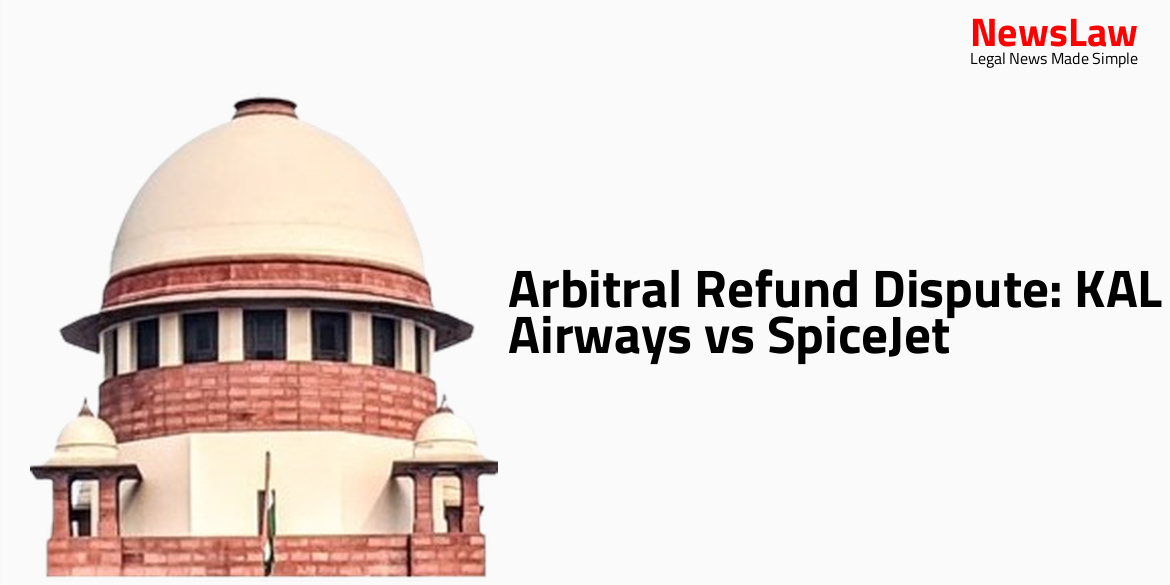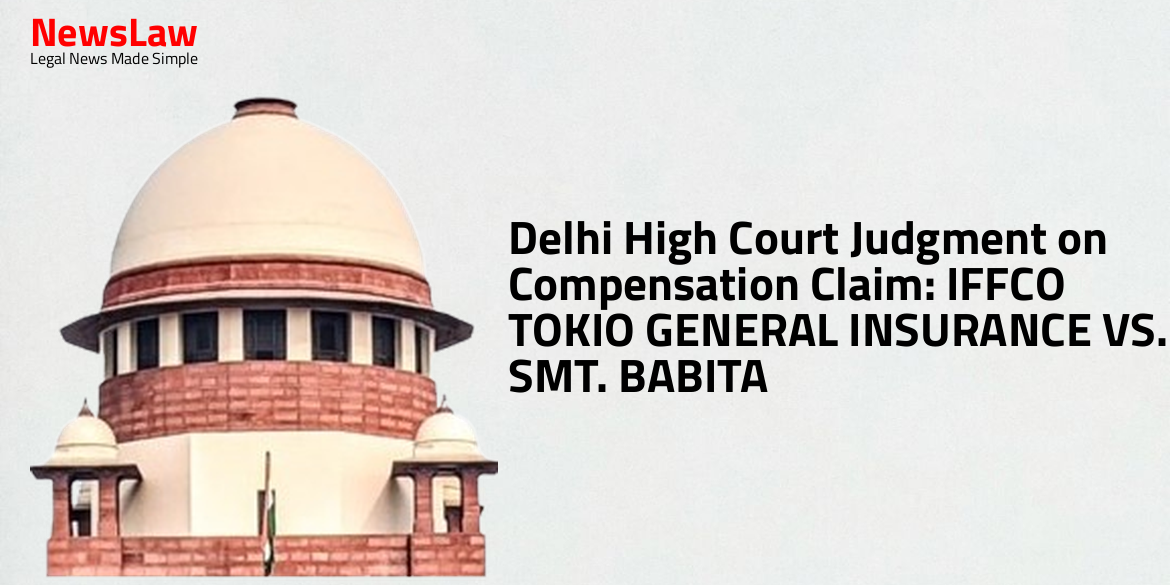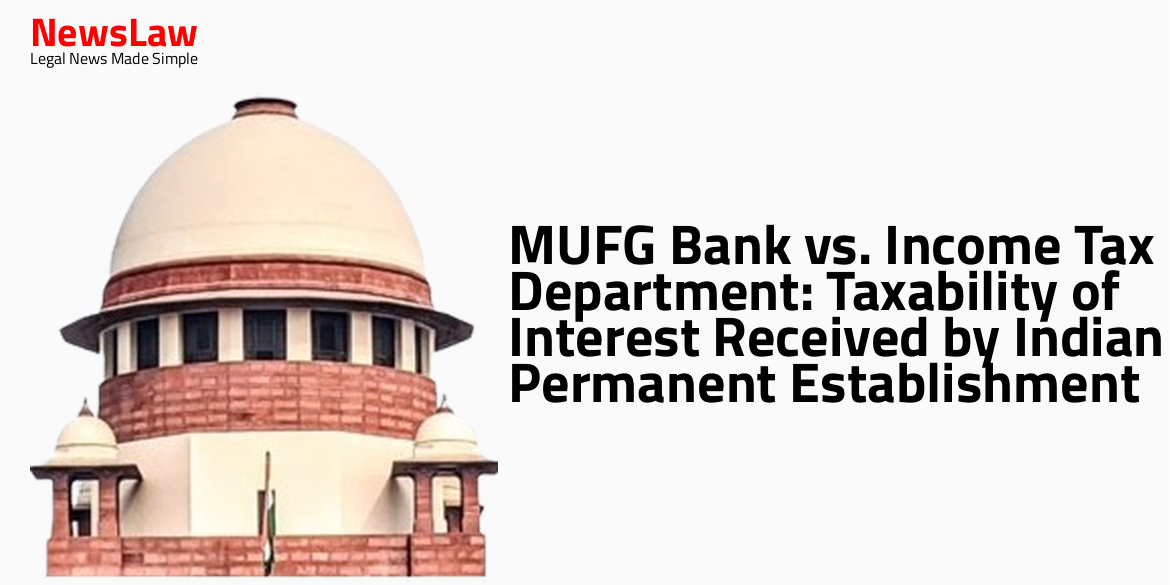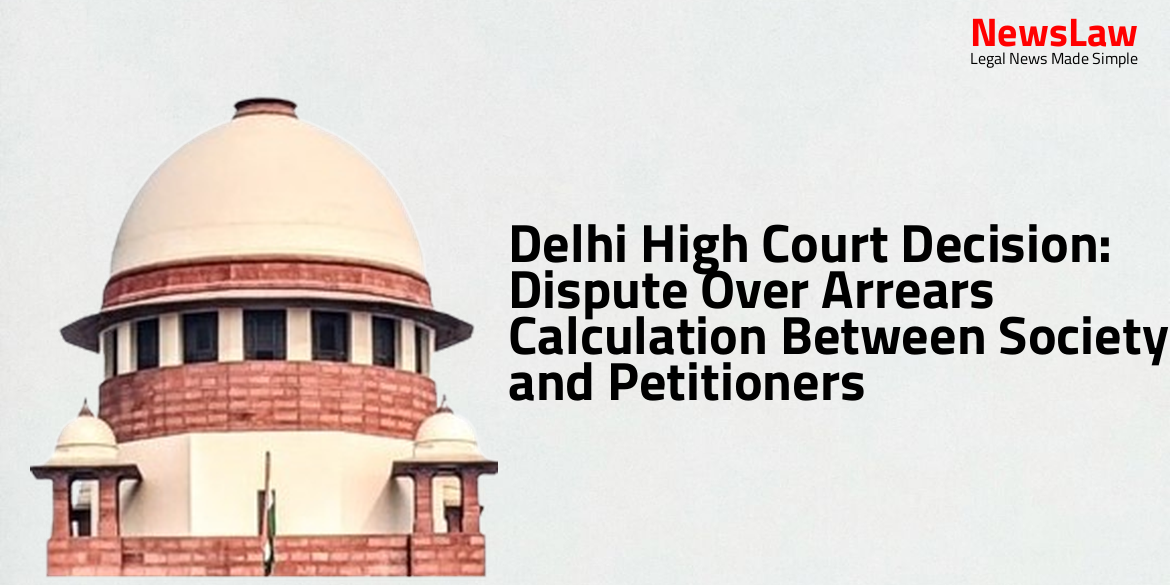The recent judgment by the Delhi High Court sheds light on the arbitral refund dispute between KAL Airways and SpiceJet. The court addressed key issues surrounding the refund direction and interest rates imposed by the Arbitral Tribunal. Stay tuned to understand the nuances of the case and the implications of the court’s ruling.
Facts
- The Arbitral Tribunal (AT) found in favor of the Claimants, KAL Airways Private Limited and Mr. Kalanithi Maran, against SpiceJet Limited and Mr. Ajay Singh.
- The AT directed the Respondents to refund a total amount of Rs. 308,21,89,461/- to the Claimants within one month, after adjusting a counterclaim of Rs. 100 Crores.
- Interest at the rate of 12% per annum was deemed appropriate by the AT on the refunded amount, considering the circumstances where the Respondents took over a significant liability and paid interest on tax amounts for the Claimants.
- The case stemmed from a transaction involving the takeover of SpiceJet by Mr. Ajay Singh from KAL and KM, where the appellants contested the judgement of the Single Judge, challenging the Arbitral Award under Section 34 of the S.
- The transaction involved the transfer of SpiceJet’s entire shareholding from KAL and KM to Mr. Ajay Singh for a nominal consideration of INR 2/-, with the aim to absolve KM of personal guarantees for loans related to SpiceJet.
- The AT found that SpiceJet was heavily indebted at the time of takeover, approximately INR 2200,00,00,000/-, and the transaction was structured to address these debts and liabilities.
- The AT also allowed a portion of a counterclaim related to interest/servicing charges paid by the Respondents, amounting to around Rs. 29 Crores.
- The impugned appellants were directed to pay interest at a rate of 18% per annum for the post-award period until 24-5-2001.
- The Arbitral Tribunal ruled in favor of the petitioners in the Counter-Claim regarding the amount of Rs. 370,86,99,209.
- The respondents had made a payment of Rs. 120,02,83,038 towards the Tranche-I CRPS amount, leaving Rs. 100 Crores to be payable by the petitioners.
- The petitioners were found liable to refund the sum deposited by the respondents, deducting the uncredited amount of Rs. 100 Crores, as the CRPS issuance obligation was not fulfilled.
- A substantial part of the total amount received by SpiceJet from SSPA was utilized for the benefit of KAL Airways and KM.
- The SSPA involved the transfer of shareholding from KAL and KM to AS for a nominal consideration of Rs. 2.
- Out of the total consideration of Rs. 220,02,93,093 to be paid by the respondents, a payment of Rs. 220,02,93,039 was made.
- Various amounts were paid by KM and KAL for warrants and CRPS subscription, with detailed utilization by SpiceJet under their ownership and control.
- The utilization of funds was explained, including payment of taxes, overdue instalments, and creation of margins with financial institutions.
- The Counter-Claim for Rs. 370,86,99,209 was deducted from the petitioners’ liability towards the respondents.
Issue
- The Court needs to determine if the appellants could obtain the remaining machinery from other sources at what price and within what timeframe.
- Additionally, the Court has to assess the potential quantity and quality of products that could be produced by the assembled plant.
- The question arises whether the arbitrator possesses the authority to grant interest pendente lite and the basis upon which such interest would be calculated.
- The argument is made that the interest rates awarded by the Arbitral Tribunal are excessive and contrary to specific sections of the Arbitration and Conciliation Act, 1996.
- The focus of the discussion is narrowed down to the validity of the refund direction of INR 270,86,99,209 and the terms of pendente lite and future interest to be paid on the awarded amount.
Arguments
- Mr. Sibal, representing the petitioner, argued that the award for refund of INR 270,86,99,209/- towards CRPS, didn’t align with the provisions of Section 65 of the Indian Contract Act, 1872.
- The contention was that KAL and KM fulfilled all obligations as per the SSPA, hence the refund direction was unjustified.
- The failure to complete the CRPS transaction due to KAL and KM not paying the full consideration as per SSPA terms was highlighted as a reason for the award being improper.
- Mr. Sibal emphasized that the AT erred in holding Mr. Ajay Singh personally liable without proper grounds or main agreement stipulations.
- Concerns were raised regarding the lack of interest rate justification by the AT and the excessiveness of interest awarded on CRPS and Warrants.
- The potential rewriting of contractual terms by the AT and the absence of reasons for interest rates were major points of contention.
- Mr. Sibal argued that the interest rate of 18% awarded by the Arbitral Tribunal is excessive and unjustified based on various Supreme Court decisions.
- The appellants proposed a solution to cancel the prior issue of Warrants and substitute them with fresh alternative instruments, which was declined by KAL and KM.
- The Custodian could not recover any sum unless he proved that the value of the machinery delivered to the appellants was greater than a specified sum, as per the impugned Award.
- The Arbitral Tribunal awarded an interest of 12% on the refund of Rs. 308 Crores disregarding the proposal made by the appellants and the infusion of funds by Ajay Singh.
- The appellants argued that the refund direction was unjustified as KAL and KM were found to be in breach of the contract terms.
- Mr. Sibal highlighted that the interest rates imposed by the Arbitral Tribunal were exorbitant and in contradiction to the terms of the Agreement.
- The AT found KAL and KM to be in breach but still held the appellants liable to effect refunds, which was contested by the appellants.
- Court directions for refunds have been observed even in cases where contracts could not be performed, as submitted by the petitioners.
- The interest rates imposed were deemed to be in violation of specific sections of the Arbitration Act, 1996, and not provided for in the SSPA terms.
- Despite the finding that the petitioners were not in breach of the Agreement, interest was still awarded by the AT.
Analysis
- Courts cannot interfere with an arbitral award in a casual or cavalier manner, but only on specified grounds.
- An Arbitral Tribunal is not equivalent to a court of law, and its functions differ from judicial functions.
- The court’s power under Section 34 of the Arbitration Act is limited and cannot be equated to normal appellate jurisdiction.
- Interest awarded by an Arbitral Tribunal is discretionary and must consider various factors.
- The rate of interest in an arbitral award must be compensatory yet not punitive or usurious.
- A party cannot be compelled to perform obligations not stipulated in the contract.
- The jurisdiction of the arbitrator is confined to the terms of the contract.
- Interference with an arbitral award should only occur in exceptional cases involving breaches of fundamental principles of justice.
- A unilateral addition or alteration to a contract is a breach of justice and allows for court interference.
- The award of interest by an Arbitral Tribunal should be informed by good faith, relevant considerations, and reasonableness.
- Section 64 of the Indian Contract Act does not apply in the present case as the breach of contract was committed by the plaintiff, not the defendants.
- Section 31(7)(b) of the Arbitration and Conciliation Act pertains to the post-award period and is not subject to party autonomy.
- The definition of ‘payment’ and ‘current rate of interest’ under relevant laws were discussed in relation to the case.
- Money paid in advance is generally refundable unless specific conditions for damages or liquidated damages are met, or there is a stipulation for forfeiture.
- The Arbitral Tribunal has discretion to award interest at a reasonable rate, unless otherwise agreed by the parties.
- After 120 days, awarding a higher rate of interest is considered arbitrary as the award-debtor can challenge the award within 120 days.
- The appellate power under Section 37 is limited to reviewing challenges under Section 34, specifically for grounds like patent illegality or against public policy.
- The Single Judge failed to consider principal challenges raised before it, leading to a lack of a clear opinion on the merits of the case.
- As a result, the Court cannot independently make findings that may deprive a party of their first-instance appellate remedy.
- The discussion on the validity of the award and interest grant in the judgment is not conclusive of all submissions raised on appeal.
- The ends of justice warrant a fresh hearing for the parties due to the errors made in the original judgment.
- The Court considered the possibility of examining the validity of the Award on its merits but decided against it.
- The issue of personal liability of Ajay Singh was not specifically raised or challenged in these appeals.
- A fresh hearing will allow both parties to address significant issues raised and preserve the right to challenge any subsequent judgment based on the remitted issues.
- The appeals are disposed of primarily due to the Single Judge’s dismissal of the Section 34 petitions without adequate consideration of the challenges raised.
Decision
- The appeals stand allowed.
- The Section 34 petitions to be considered afresh.
- Amount of Rs. 308,21,89,461 /- to be refunded to the Claimants.
- Events from SSPA to cash deposit of Rs. 250 crores included in explanation.
- Decision on offer by the Respondents to be taken by Claimants within two months.
- Amount involved to be calculated for about 30 months.
Case Title: SPICEJET LIMITED Vs. KAL AIRWAYS PRIVATE LIMITED & ANR. & ORS. (2024:DHC:3990-DB)
Case Number: FAO(OS) (COMM)-180/2023



